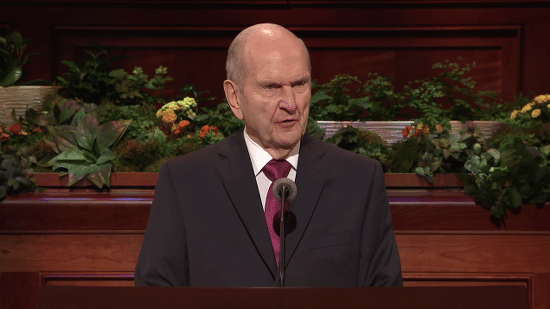To get out of poverty, the poor should give away a chunk of their money.
Make sense?
It certainly does to 93-year-old Russell M. Nelson, who was elected president of the Church of Jesus Christ of Latter-day Saints back in January. Nelson, who is currently on a trip around the world with his LDS entourage, brought the tithing message to Nairobi, Kenya this week. Eager audiences awaited.

To listen Monday to an LDS Church president’s voice in person for the first time, East African Mormons traveled hundreds of miles in dust-covered buses, bouncing and swaying over dirt roads, broken streets and omnipresent speedbumps. …
“It’s a once-in-a-lifetime opportunity. He is the second prophet to come here in the history of the church,”
… marveled LDS follower Jane Malakwen.
Some of her fellow worshipers had traveled 16 hours for the chief Mormon’s 35-minute talk, called a “special devotional” in the Church’s parlance.
Its most eye-popping part was special indeed: pay us and you’ll cease being poor.
“We preach tithing to the poor people of the world because the poor people of the world have had cycles of poverty, generation after generation,” [Russell Nelson] said. “That same poverty continues from one generation to another, until people pay their tithing.”
He’s not wrong. If poor people give away enough of their money, they’ll eventually die. Presto: no more poor people. Genius, really.
According to Utah’s Deseret News, “Sister Nelson” also spoke — no first name given anywhere in the piece. She is the wife of the LDS president and, of course, agrees fully with her husband when it comes to how vital generous donations to the Church are to believers’ spiritual and material well-being.
“Think about something you need. … What would make your life better right now? What are the eternal laws that govern that blessing? What eternal law would you need to live so that you could receive that blessing?” The eternal law that governs finances is tithing, Sister Nelson said.
The crowd was hoping to receive news of Nairobi’s first Mormon temple, the construction of which was announced a year ago. The LDS Church remains tight-lipped about that endeavor, however, allowing that a site hasn’t even been selected yet. But, naturally, that’s independent of the tithing, which is required now.
Meanwhile, until Kenyans have their own temple, they should travel “as often as the circumstances and the finances and transportation will allow” to the LDS house of worship in Johannesburg, said Elder Jeffrey R. Holland of the Quorum of the Twelve Apostles when he took the stage. (That’s Johannesburg, South Africa — four countries and 2,500 miles away).
“Nothing will bless you more,” he said, “nothing will unite your family more, nothing will bless your children more, nothing will bless your ancestors more. Quite frankly, there is nothing that will bless you in any way more than your attendance at the temple, a place of peace, a place of revelation, a place of joy, a place of comfort, a place of purity, all the best things in life.”
And the devout crowd murmured in assent and appreciation, and not a Hasa Diga Eebowai was heard.
=-=-=-=-=-=-=-=-=-=-=-=-=-=-=
P.S.: A good dozen years ago, a Mormon financial advisor named Curtis DeYoung started stealing, over time, almost $25 million from his clients’ retirement accounts. God sure works in mysterious ways, because DeYoung, a prayerful man, remembered the tithing requirement and sluiced some of the loot to the LDS Church.
After the fraud was exposed, the LDS powers that be determined that no way were they giving back that pilfered money — claiming that they’d received it from the criminal’s wife (who’d received it from him, but who, unlike her husband, didn’t go to jail). Only after the victims went to the press, and the Securities and Exchange Commission got involved, did the Church grudgingly agree to a settlement of about 62 cents on the dollar.
Clearly, not all fences make good neighbors.
(Screenshot via YouTube)




It’s Moving Day for the Friendly ..."
It’s Moving Day for the Friendly ..."
It’s Moving Day for the Friendly ..."
It’s Moving Day for the Friendly ..."